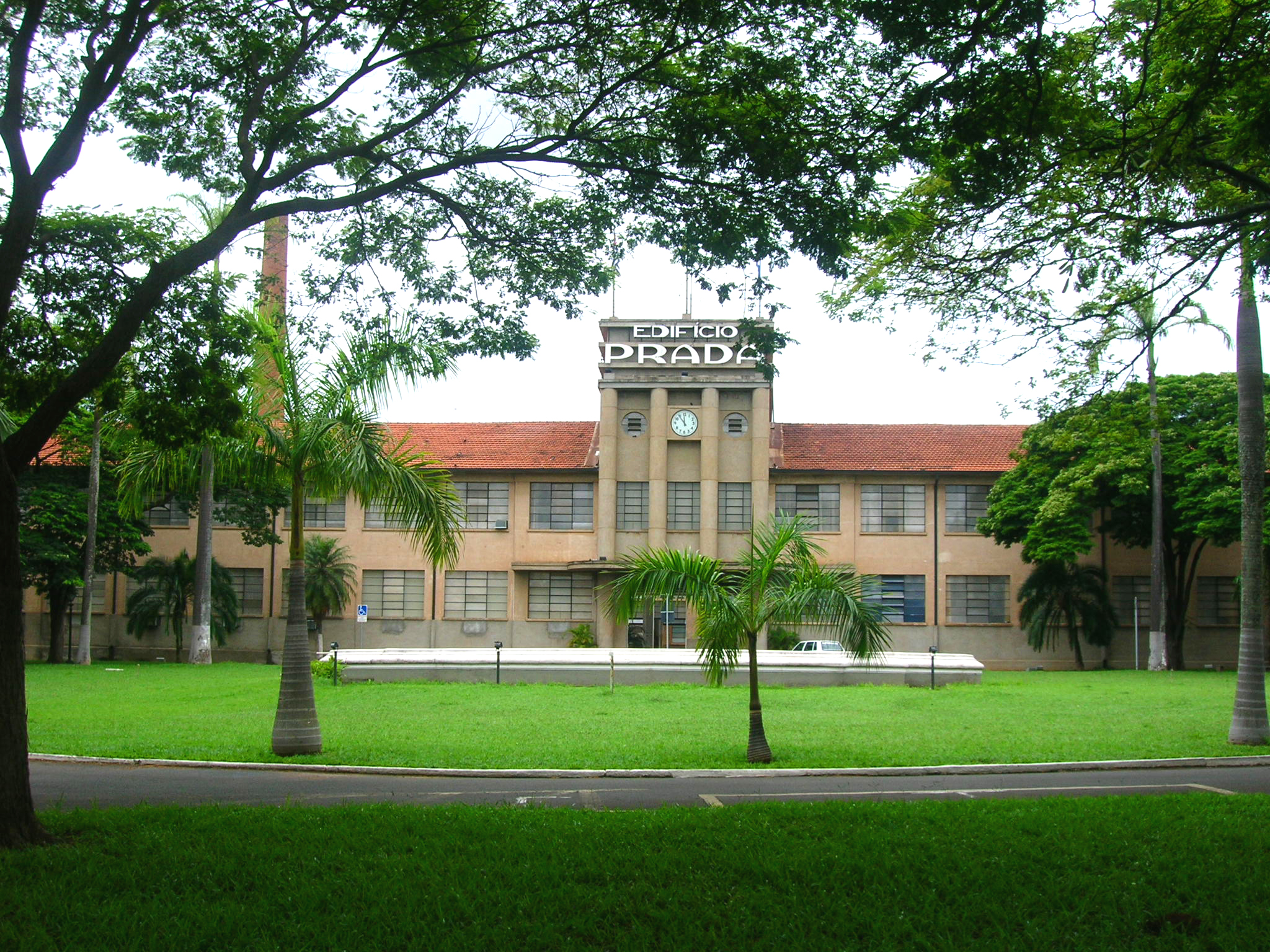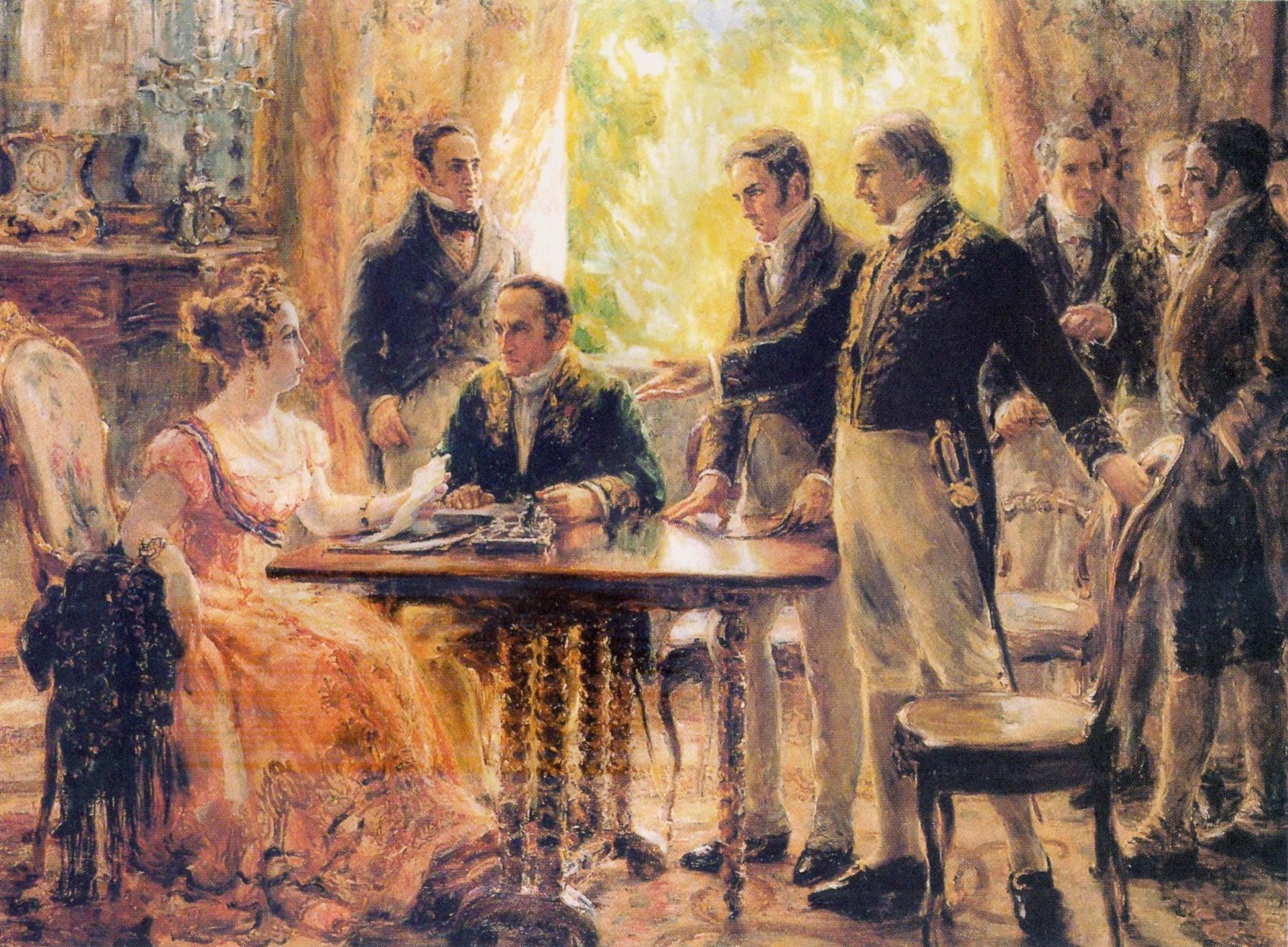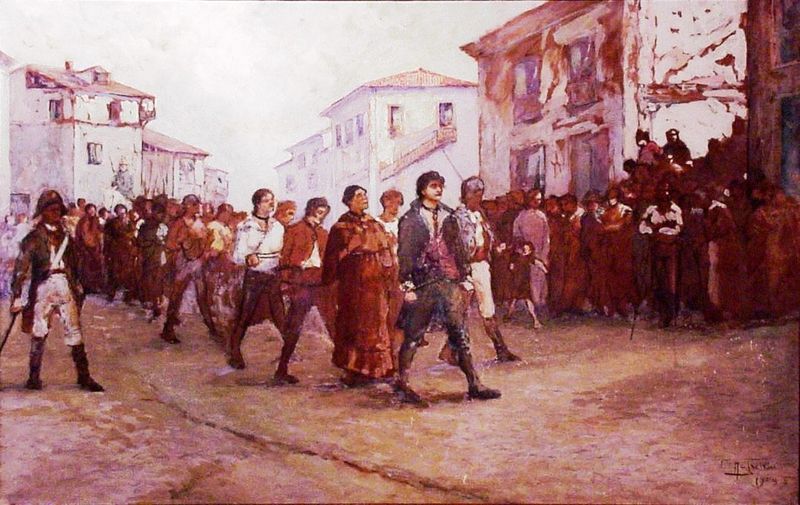|
Nicolau Pereira De Campos Vergueiro
Nicolau Pereira de Campos Vergueiro, better known as Senator Vergueiro ( pt, Senador Vergueiro) (20 December 1778 – 17 September 1859), was a Portuguese-born Brazilian coffee farmer and politician. He was a pioneer in the implementation of free workforce in Brazil by bringing the first European immigrants to work in the Ibicaba farm, which he owned. The contract was prepared by Vergueiro himself, establishing ownership of the production and other measures, mostly of an exploitive nature. Faced with this, the immigrants working in Vergueiro's main property, the Ibicaba farm, revolted under the guidance of Thomas Davatz, a Swiss immigrant and religious leader, who instigated the immigrant workers to grow their ambition to become small or medium-sized landowners, as they imagined they would be when they had left Europe. Biography Vergueiro was born on 20 December 1778 in Vale da Porca, Portugal, to Luiz Bernardo Pereira Vergueiro and Clara Maria Borges Campos. He graduated with ... [...More Info...] [...Related Items...] OR: [Wikipedia] [Google] [Baidu] |
Vale Da Porca (Macedo De Cavaleiros)
Vale da Porca is a Portuguese parish located in the municipality of Macedo de Cavaleiros (Bragança District Bragança District ( pt, Distrito de Bragança ; mwl, Çtrito de Bergáncia) is a traditional political division of Portugal, in the northeast corner bordering on Spain (Castile and Leon and Galicia), covering 7.4% of the nation's continental l ...). The population in 2011 was 286, in an area of 17.43 km². References Freguesias of Macedo de Cavaleiros {{Bragança-geo-stub ... [...More Info...] [...Related Items...] OR: [Wikipedia] [Google] [Baidu] |
Piracicaba
Piracicaba ( or ) is a city located in the Brazilian state of São Paulo. The population is 407,252 (2020) in an area of 1378.07 km². It is at an elevation of 547 m above sea level. Name The place name comes from a word in the Tupi language that means "place where the fish stops", and it is formed by the junction of the terms ''pirá'' ("fish"), ''syk'' ("stop") e ''aba'' ("place").. The name refers to the waterfalls of the Piracicaba River, which bisects the city, which is a point where the "piracema"—fish swimming upstream to reproduce— are stopped. History In 1766, Antonio Correa Barbosa, charged with the task of establishing a settlement on the estuary of Piracicaba river, opted for a location about from it. The settlement was officially founded on August 1, 1767, as a ''povoação'' subordinated to the ''vila of'' Itu. In 1784, Piracicaba gets emancipated from Itu, becoming a ''freguesia.'' In 1821, the freguesia is promoted to ''vila'', known as Vila Nova d ... [...More Info...] [...Related Items...] OR: [Wikipedia] [Google] [Baidu] |
Lei Áurea
The (; from Portuguese: Golden Law), adopted on May 13, 1888, was the law that abolished slavery in Brazil. It was signed by Isabel, Princess Imperial of Brazil (1846–1921), an opponent of slavery, who acted as regent to Emperor Pedro II, who was in Europe. The Lei Áurea was preceded by the Rio Branco Law of September 28, 1871 ("the Law of Free Birth"), which freed all children born to slave parents, and by the Saraiva-Cotegipe Law (also known as "the Law of Sexagenarians"), of September 28, 1885, that freed slaves when they reached the age of 60. Brazil was the last country in the Western world to abolish slavery. Background Aside from the activities of abolitionists, there were a number of reasons for the signing of the law: slavery was no longer profitable, as the wages of European immigrants, whose working conditions were poor, cost less than the upkeep of slaves, and the decline in the arrival of new slaves Text The text of the was brief: Analysis T ... [...More Info...] [...Related Items...] OR: [Wikipedia] [Google] [Baidu] |
Debt Bondage
Debt bondage, also known as debt slavery, bonded labour, or peonage, is the pledge of a person's services as security for the repayment for a debt or other obligation. Where the terms of the repayment are not clearly or reasonably stated, the person who holds the debt has thus some control over the laborer, whose freedom depends on the undefined debt repayment. The services required to repay the debt may be undefined, and the services' duration may be undefined, thus allowing the person supposedly owed the debt to demand services indefinitely. Debt bondage can be passed on from generation to generation. Currently, debt bondage is the most common method of enslavement with an estimated 8.1 million people bonded to labour illegally as cited by the International Labour Organization in 2005. Debt bondage has been described by the United Nations as a form of "modern day slavery" and the Supplementary Convention on the Abolition of Slavery seeks to abolish the practice.Article 1(a) of ... [...More Info...] [...Related Items...] OR: [Wikipedia] [Google] [Baidu] |
Limeira
Limeira is a city in the eastern part of the Brazilian state of São Paulo. The population is 308,482 (2020 est.) in an area of 581 km2. The elevation is 588 m. It is 154 km from São Paulo, the state capital, and 1011 km from Brasilia, Brazil's capital. The city can be easily reached from São Paulo by two highways: Rodovia Anhanguera and Rodovia dos Bandeirantes. Once an important and strategical pole of the coffee culture, Limeira was also known as the "Brazilian orange capital" due to the great citrus production that occurred in the past, although now the main crop cultivated in the city is the sugar cane. Afterwards, it became recognized by its new plated jewelry and semi-jewelry industry which attract customers from all over the world, giving the city the title of "Brazil's plated jewellery capital". There are more than 450 companies that are responsible for half of Brazil's exports in this sector. There is a famous farm located in Limeira, Fazenda Ibi ... [...More Info...] [...Related Items...] OR: [Wikipedia] [Google] [Baidu] |
Manuel Alves Branco, 2nd Viscount Of Caravelas
Manuel Alves Branco (), the 2nd Viscount of Caravelas (7 June 1797 – 13 July 1855) was a Brazilian politician, economist, lawyer and magistrate during the period of the Empire of Brazil (1822–1889). He was general deputy, justice minister, economy minister, senator and also the first prime-minister of the Empire (President of the Council of Ministers). Biography During his political career he was member of Chamber of Deputies, Minister of Justice, Minister of Finance A finance minister is an executive or cabinet position in charge of one or more of government finances, economic policy and financial regulation. A finance minister's portfolio has a large variety of names around the world, such as "treasury", " ..., President of the Cabinet and Senator of the Empire of Brazil. He was four times Minister of Finance - from May 16 to September 19, 1837; from September 1, 1839, to May 18, 1840; from February 2, 1844, to May 2, 1846, and from 22 May to 20 October 1847, resu ... [...More Info...] [...Related Items...] OR: [Wikipedia] [Google] [Baidu] |
Pedro I Of Brazil
Don (honorific), Dom Pedro I (English: Peter I; 12 October 1798 – 24 September 1834), nicknamed "the Liberator", was the founder and List of monarchs of Brazil, first ruler of the Empire of Brazil. As King Dom Pedro IV, he List of Portuguese monarchs#House of Braganza (1640–1910), reigned briefly over Kingdom of Portugal, Portugal, where he also became known as "the Liberator" as well as "the Soldier King". Born in Lisbon, Pedro I was the fourth child of King Dom John VI of Portugal and Queen Carlota Joaquina of Spain, Carlota Joaquina, and thus a member of the House of Braganza. When the country was invaded by French troops in 1807, he and his family fled to Portugal's largest and wealthiest colony, Brazil. The outbreak of the Liberal Revolution of 1820 in Lisbon compelled Pedro I's father to return to Portugal in April 1821, leaving him to rule Brazil as regent. He had to deal with challenges from revolutionaries and insubordination by Portuguese troop ... [...More Info...] [...Related Items...] OR: [Wikipedia] [Google] [Baidu] |
Martim Francisco Ribeiro De Andrada
Martim Francisco Ribeiro de Andrada (9 April 1775 – 23 February 1844) was a Brazilian politician who played a leading role in the declaration of Brazil's independence and in the government during the years that followed. He was twice Minister of Finance. Early years Martim Francisco Ribeiro de Andrada was born in Santos, São Paulo on 9 April 1775. At the time Santos was just a village. His parents were Colonel José Bonifácio Ribeiro de Andrada and Maria Bárbara da Silva. His brothers were Antônio Carlos and José Bonifácio de Andrada. He attended the University of Coimbra in Portugal, where he received degrees in philosophy (1797) and mathematics (1798). He earned a PhD in Natural Sciences. At the university he worked with the friar José Mariano de Conceição Vellozo, a naturalist, in translating works on mineralogy and agriculture. After returning to Brazil, Ribeiro de Andrada was appointed inspector general of mines in São Paulo state. He traveled extensively in S� ... [...More Info...] [...Related Items...] OR: [Wikipedia] [Google] [Baidu] |
José Bonifácio De Andrada E Silva
José Bonifácio de Andrada e Silva (; 13 June 17636 April 1838) was a Brazilian statesman, naturalist, mineralist, professor and poet, born in Santos, São Paulo, then part of the Portuguese Empire. He was one of the most important mentors of Brazilian independence, and his actions were decisive for the success of Emperor Pedro I. He supported public education, was an abolitionist and suggested that a new national capital be created in Brazil's underdeveloped interior (effected over a century later as Brasília). His career as naturalist was marked by the discovery of four new minerals. Life In 1800, Andrada e Silva was appointed professor of geology at Coimbra, and soon after inspector-general of the Portuguese mines; and in 1812 he was made perpetual secretary of the Lisbon Academy of Sciences. Returning to the colony in 1819, he urged Dom Pedro I to resist the recall of the Lisbon court, and was appointed one of his ministers in 1821. When the independence of Brazil ... [...More Info...] [...Related Items...] OR: [Wikipedia] [Google] [Baidu] |
Antônio Carlos Ribeiro De Andrada
Antônio Carlos Ribeiro de Andrada Machado e Silva (1 November 1773 – 5 December 1845) was a Brazilian judge (''juiz de fora''), appellate judge (''desembargador'') and politician. At the time of Brazilian Independence, he often used the pseudonym "Philagiosetero" in his newspaper articles. He adopted the parliamentary name of "Andrada Machado". A brother of José Bonifácio and Martim Francisco, he was known for the scathingness of his speech against despotism and for his involvement in the Pernambuco Revolt, in addition to his extensive involvement and role during the first Constituent Assembly of 1823 that was tasked with drafting Brazil's first constitution. Biography Early life and education It is possible to say that, of the three Andrada brothers, José Bonifácio, Martim Francisco and Antônio Carlos, the latter received the least attention from modern historiography. While the stories of José Bonifácio and Martim Francisco are well documented, the life, career ... [...More Info...] [...Related Items...] OR: [Wikipedia] [Google] [Baidu] |
Constituent Assembly
A constituent assembly (also known as a constitutional convention, constitutional congress, or constitutional assembly) is a body assembled for the purpose of drafting or revising a constitution. Members of a constituent assembly may be elected by Direct election, popular vote, drawn by sortition, appointed, or some combination of these methods. Assemblies are typically considered distinct from a regular legislature, although members of the legislature may compose a significant number or all of its members. As the fundamental document constituting a state, a constitution cannot normally be modified or amended by the state's normal legislative procedures in some jurisdictions; instead a constitutional convention or a constituent assembly, the rules for which are normally laid down in the constitution, must be set up. A constituent assembly is usually set up for its specific purpose, which it carries out in a relatively short time, after which the assembly is dissolved. A constituen ... [...More Info...] [...Related Items...] OR: [Wikipedia] [Google] [Baidu] |
Independence Of Brazil
The Independence of Brazil comprised a series of political and military events that led to the independence of the Kingdom of Brazil from the United Kingdom of Portugal, Brazil and the Algarves as the Brazilian Empire. Most of the events occurred in Bahia, Rio de Janeiro, and São Paulo between 1821–1824. It is celebrated on 7 September, although there is a controversy whether the real independence happened after the Siege of Salvador on July 2 of 1823 in Salvador, Bahia where the independence war was fought. However, September 7th is the anniversary of the date in 1822 that prince regent Dom Pedro declared Brazil's independence from his royal family in Portugal and the former United Kingdom of Portugal, Brazil and Algarves. Formal recognition came with a treaty three years later, signed by the new Empire of Brazil and the Kingdom of Portugal in late 1825. Background The land now called Brazil was claimed by the Kingdom of Portugal in April 1500, on the arrival of the Por ... [...More Info...] [...Related Items...] OR: [Wikipedia] [Google] [Baidu] |









